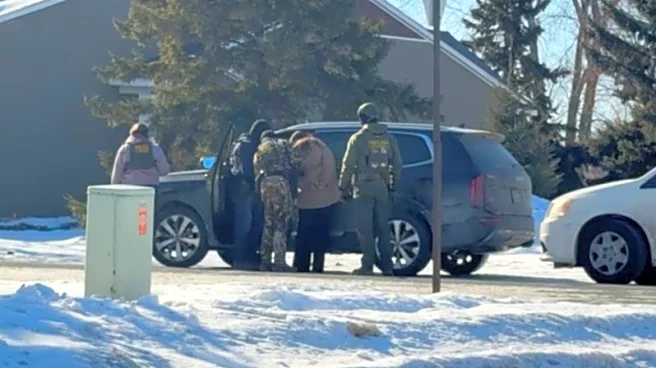What's Happening?
Morgan Ortagus, the Deputy United States Special Envoy to the Middle East, is set to visit Beirut for discussions with Lebanese officials regarding the disarmament of Hezbollah. This visit comes amid escalating
tensions between Israel and Hezbollah, following intensified Israeli strikes in southern and eastern Lebanon. These strikes have resulted in the deaths of over a dozen individuals, primarily Hezbollah members, according to Lebanese security officials. The situation has raised concerns that Israel may resume major air operations despite a ceasefire established in November 2024, which ended a yearlong conflict between Israel and the Iran-backed group. Ortagus is expected to participate in a meeting on Wednesday to review the Lebanese army's efforts to dismantle Hezbollah's weapons caches in the south, as stipulated by the truce.
Why It's Important?
The visit by Morgan Ortagus underscores the ongoing geopolitical tensions in the Middle East, particularly the fragile peace between Israel and Hezbollah. The disarmament of Hezbollah is a critical issue, as the group's refusal to comply with the ceasefire terms could lead to renewed conflict, impacting regional stability. The situation poses significant risks for Lebanon, which could face further military engagements and economic repercussions. Additionally, the involvement of U.S. envoys highlights the international community's interest in maintaining peace and preventing escalation, which could have broader implications for U.S. foreign policy and its role in Middle Eastern affairs.
What's Next?
The upcoming meeting involving Morgan Ortagus and Lebanese officials will focus on the Lebanese army's progress in disarming Hezbollah. The outcome of these discussions could influence future diplomatic and military actions in the region. If Hezbollah continues to resist disarmament, it may provoke further Israeli military responses, potentially destabilizing the area. The international community, including U.N. peacekeepers, will likely continue to monitor the situation closely, aiming to prevent any escalation that could lead to a broader conflict.
Beyond the Headlines
The situation in Lebanon highlights the complex interplay of regional politics, where local actions can have far-reaching consequences. The disarmament of Hezbollah is not only a military issue but also a political one, involving negotiations and compromises that could affect Lebanon's sovereignty and its relations with neighboring countries. The involvement of U.S. envoys reflects the strategic importance of Lebanon in Middle Eastern geopolitics, where maintaining peace is crucial for regional and global stability.









